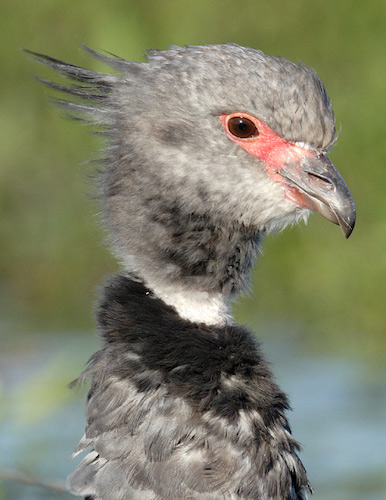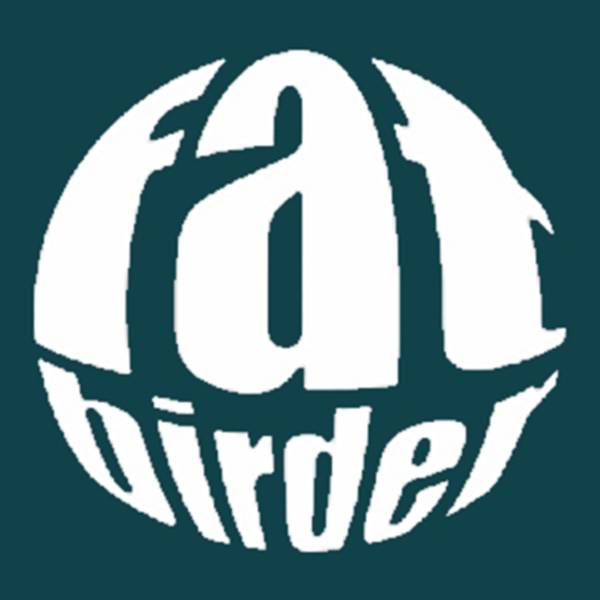Anhimidae – Screamers

The Anhimidae or Screamers are a small family of birds in the Anseriformes order, which also includes Magpie Geese, ducks, geese and swans. For a long time, they were thought to be most closely related to the Galliformes because of similar bills, but DNA analysis reveals that they are instead more closely related to ducks (family Anatidae), most closely to the Magpie Goose (which some DNA evidence suggests are closer to screamers than to ducks). The clade is exceptional within living birds in lacking uncinate processes of ribs. The screamers are represented by just three species.
They only occur in South America. They are large, bulky birds, with a small downy head, long legs and large feet which are only partly webbed. They have large spurs on their wings which are used in fights over mates and territorial disputes and can break off in the breast of other screamers. The spurs re-grow and are, anyway, regularly renewed. Unlike ducks, they have only a partial moult, and are able to fly throughout the year. They live in open areas and marshes with some grass and feed on water plants. One species, the Southern Screamer, is considered a pest as it raids crops and competes with farmed birds.

Southern Screamers Chauna torquata – ©Dubi Shapiro
They lay between two and seven white eggs, with four or five being typical. The young, like those of most Anseriformes, can run as soon as they are hatched. The chicks are usually raised in or near water as they can swim better than they can run, which helps them to avoid predators. Like ducks, screamer chicks imprint early in life. This, coupled with their unfussy diet makes them amenable to domestication. They make excellent watchdogs due to their loud screams when encountering anything new and potentially threatening.
Both the Southern and the Horned Screamer remain widespread and are overall fairly common. In contrast, the Northern Screamer is relatively rare and consequently considered near threatened. They are seldom hunted, in spite of their conspicuous nature, because their flesh has a spongy texture and is riddled with air-sacs, making it highly unpalatable. Their main threats are habitat destruction and the increased intensification of agriculture.
-
Number of bird species: 3
(As at July 2025)
The IOC list just three species in two genera of Screamers in the family Anhimidae; which are:
Horned Screamer Anhima cornuta
Northern Screamer Chauna chavaria
Southern Screamer Chauna torquata
-
Ducks, Geese and Swans (2-Volume Set)
| By Janet Kear | OUP | 2005 | Hardback | 832 pages, 30 colur plates, b/w illustrations, b/w distribution maps, tables | ISBN: 9780198546450 Buy this book from NHBS.com
-
Anhimidae
Family AccountThe Anhimidae are a small family of three Neotropical waterfowl — called Screamers, and assigned to two genera — that are placed in the Anseriformes with ducks, geese, and swans. -
Anhimidae
Family AccountAnhimidae comprises two genera (Anhima, Chauna) and three species. -
Anhimidae
Family AccountThe screamers are three South American bird species placed in family Anhimidae. They were thought to be related to the Galliformes because of similar bills.
-
Horned Screamer Anhima cornuta
Species AccountThese large birds have a wing span of about 1.70 metres. Both sexes have a horn protruding from the forehead but this is quite brittle and can break off although it grows back again… -
Horned Screamer Anhima cornuta
Species AccountBirdLife species profile... -
Horned Screamer Anhima cornuta
Species AccountEnormous, ungainly ogre of a bird. Found around freshwater marshes and rivers in Amazonian lowlands. Dark gray and black overall with a scaly white neck and ... -
Horned Screamer Anhima cornuta
Species AccountThe horned screamer (Anhima cornuta) is a member of a small family of birds, the Anhimidae, which occurs in wetlands of tropical South America. -
Horned Screamer Anhima cornuta
Species AccountImages -
Horned Screamer Anhima cornuta
Species AccountSound archive and distribution map... -
Northern Screamer Chauna chavaria
Species AccountThe Northern Screamer (Chauna chavaria), also known as the Black-necked Screamer, is a large species of bird in the small family Anhimidae, the screamers. It is a resident breeder in northern Colombia, in Chocó, Antioquia, Córdoba, Sucre, Bolívar, Magdalena, Santander, and Cesar Departments and northwestern Venezuela, in Zulia, Mérida, and Trujillo States.[2] On average, they are 88.9 cm (35 in) long and weigh about 3.9 kg (8.6 lb)... -
Northern Screamer Chauna chavaria
Species AccountHuge, ungainly bird with thick red legs, red face, and a wispy crest. Body mostly gray with black neck and whitish cheeks. In flight shows white underwings. -
Northern Screamer Chauna chavaria
Species AccountSound archive and distribution map... -
Southern Screamer Chauna torquata
Species AccountThe Screamers are related to ducks, geese and swans as members of the Anseriformes order of birds. They are generally believed to be more primitive forms of the order like the Magpie Goose (Anseranas semipalmata) of Australia. However, Sick says that the fact that they have abandoned the filtering technique of eating suggests that they are, in fact, more evolved than their duck and goose cousins… -
Southern Screamer Chauna torquata
Species AccountHuge and odd-looking gray gooselike species with long red legs. Note the wispy crest on the back of the head, the bare red face, and a broad dark collar ... -
Southern Screamer Chauna torquata
Species AccountThe southern screamer (Chauna torquata), also known as the crested screamer, belongs to the order Anseriformes. It is found in southeastern Peru, northern Bolivia, Paraguay, southern Brazil, Uruguay and northern Argentina -
Southern Screamer Chauna torquata
Species AccountImages -
Southern Screamer Chauna torquata
Species AccountIUCN species profile... -
Southern Screamer Chauna torquata
Species AccountSound archive and distribution map...
-
Horned Screamer Anhima cornuta
ArticleObservations on the Horned Screamer - Frank B. Gill, F. J. Stokes and C. C. Stokes, The Wilson Bulletin - Vol. 86, No. 1 (Mar., 1974), pp. 43-50
-
Horned Screamer Anhima cornuta
VideoPantanal BirdClub always see this magnificent species in our stakeout to the way to Emas NP... -
Northern Screamer Chauna chavaria
VideoNorthern Screamers are really cool birds we normally find in the Magdalena Valley while driving; these big birds are almost endemics to Colombia. This video if from the 1st trip from a series with US clients birding all Colombia...
